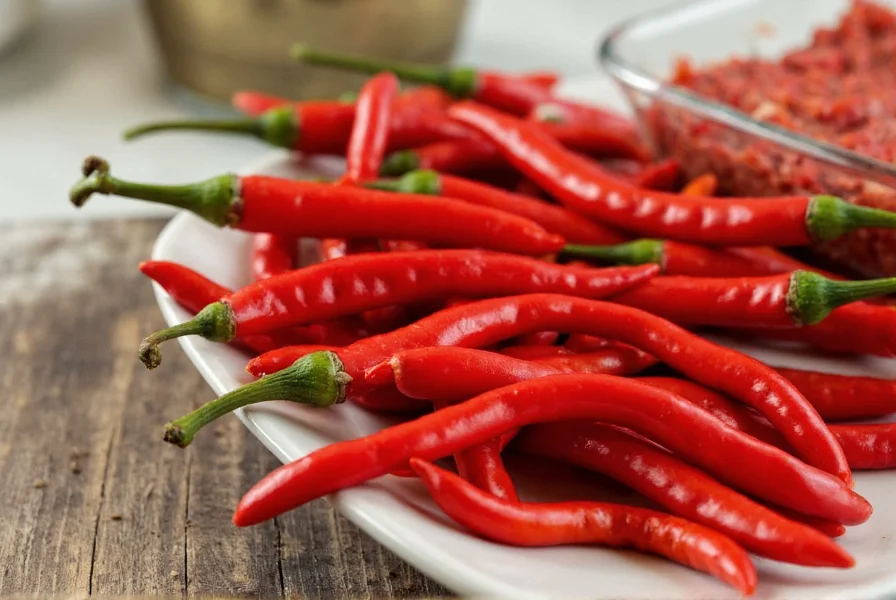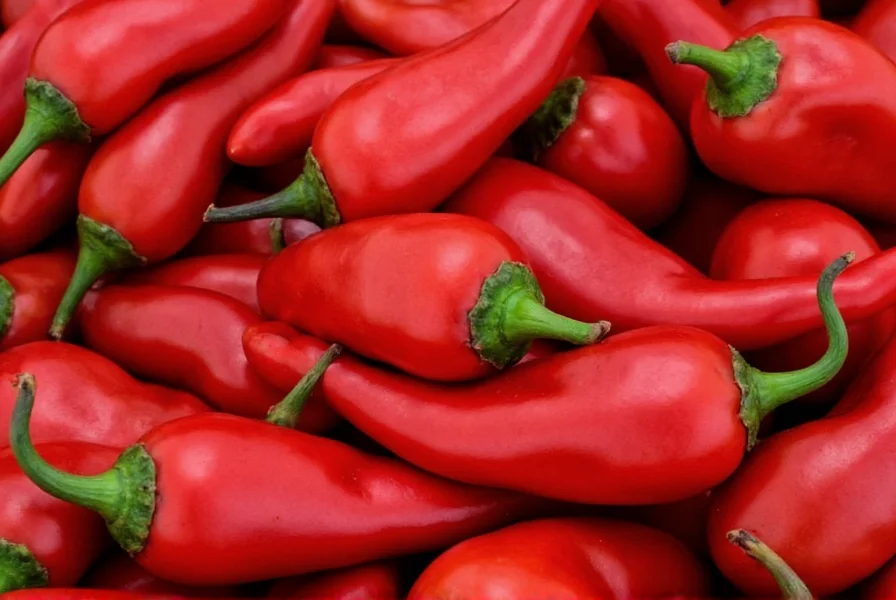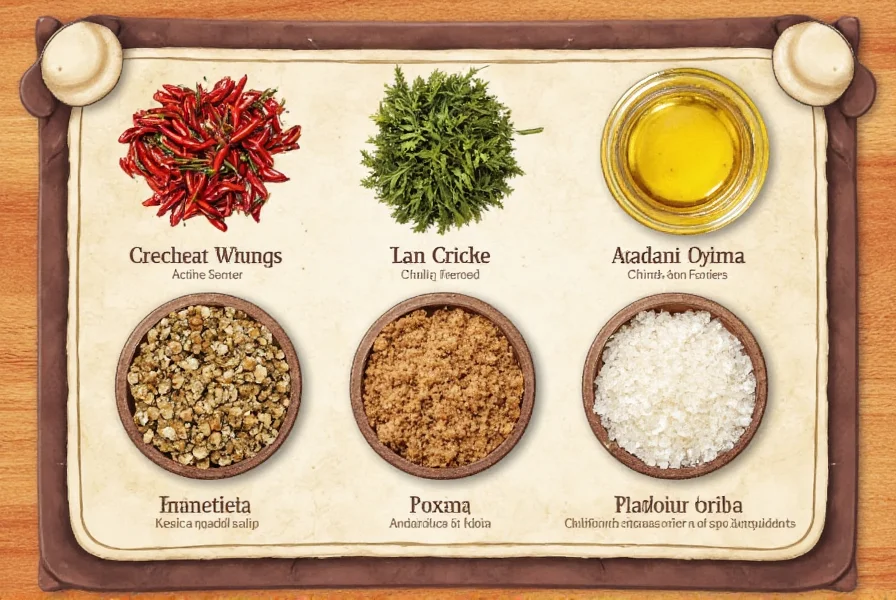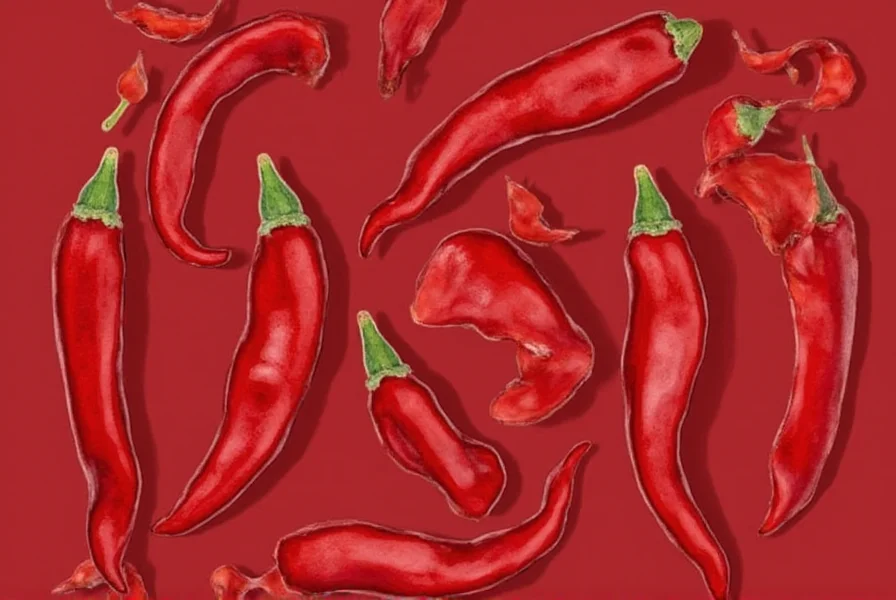Bird's eye chili (also known as Thai chili or small red chili) is a small, fiery pepper with a Scoville Heat Unit (SHU) range of 50,000 to 100,000, making it significantly hotter than jalapeños. This intensely spicy pepper is a staple in Southeast Asian, Indian, and Latin American cuisines, delivering bold flavor and heat to dishes like curries, salsas, and stir-fries. In this guide, we'll cover everything you need to know about bird's eye chili, including its heat level, culinary uses, buying tips, storage methods, and safety precautions based on authoritative culinary and scientific sources.
Table of Contents
- Introduction to Bird's Eye Chili
- Heat Level and Flavor Profile
- Cooking Tips and Practical Uses
- Comparing Chili Varieties
- Storage Tips for Long-Lasting Flavor
- Frequently Asked Questions
- Conclusion
Introduction to Bird's Eye Chili
Bird's eye chili (Capsicum frutescens) is a small, pointed chili pepper native to Southeast Asia but now cultivated globally. It's commonly called "Thai chili" or "small red chili" due to its size and color. According to the USDA Agricultural Research Service, bird's eye chili is a key ingredient in Thai cuisine, where it's used fresh, dried, or ground to add heat to dishes like pad kra pao and green curry. Its compact size belies its intense spiciness, with just one pepper capable of significantly elevating a dish's heat level.
Heat Level and Flavor Profile
Bird's eye chili ranks between 50,000 and 100,000 Scoville Heat Units (SHU), making it 5-20 times hotter than jalapeños (2,500-8,000 SHU) and 2-4 times hotter than serrano peppers (10,000-23,000 SHU). The heat is concentrated in the seeds and white membranes, so removing these parts can reduce spiciness while preserving flavor. According to the National Institutes of Health (NIH), capsaicin—the compound responsible for heat—also contributes to health benefits like metabolism boosting and anti-inflammatory effects.
Beyond heat, bird's eye chili has a distinct fruity, citrusy flavor with subtle smokiness when roasted. This complexity makes it versatile for both savory dishes (like stir-fries and salsas) and sweet applications (such as spicy chocolate desserts or fruit jams).
Cooking Tips and Practical Uses
Follow these expert-approved techniques to use bird's eye chili effectively:
- Use Fresh or Dried: Fresh chilies can be sliced into salsas or curries; dried ones should be rehydrated in warm water before use or ground into powder for spice blends.
- Control Heat: Remove seeds and membranes to reduce spiciness. Toasting dried chilies before grinding mellows heat while enhancing smoky notes.
- Pair with Complementary Flavors: Combine with garlic, ginger, lime, or coconut milk to balance heat. Thai chefs often use bird's eye chili in marinades for grilled meats or fish.
- Roast for Depth: Roasting over an open flame or under the broiler caramelizes sugars and adds complexity. This technique is popular in Mexican and Thai cuisines.
- Experiment Safely: Start with 1/4 of a chili and adjust gradually. Always wear gloves when handling to avoid skin irritation.
| Chili Variety | Heat Level (SHU) | Flavor Notes | Best For |
|---|---|---|---|
| Bird's Eye Chili | 50,000-100,000 | Fruity, citrusy, smoky | Thai curries, Vietnamese pho, salsas |
| Jalapeño | 2,500-8,000 | Grassy, mild heat | Mexican salsas, nachos, stuffed peppers |
| Habanero | 100,000-350,000 | Fruity, floral, intense heat | Hot sauces, Caribbean jerk seasoning, cocktails |
| Kashmiri Chili | 1,000-2,000 | Earthy, sweet, vibrant color | Indian curries, biryanis, spice blends |
Storage Tips for Long-Lasting Flavor
Preserve freshness and heat with these storage methods:
- Fresh Chilies: Store in a paper towel-lined container in the refrigerator for up to 2 weeks. For longer storage, freeze whole chilies in a sealed bag for up to 6 months.
- Dried Chilies: Keep in an airtight container away from light and moisture. Properly stored, they retain flavor for 1-2 years.
- Chili Oil: Infuse dried chilies in neutral oil (e.g., canola or grapeseed). Store in the refrigerator for up to 1 month. Always use clean utensils to prevent contamination.
- Ground Powder: Store in a dark glass jar with a tight lid. Use within 6 months for optimal potency.
Frequently Asked Questions About Bird's Eye Chili
How hot is bird's eye chili compared to other peppers?
Bird's eye chili ranges from 50,000 to 100,000 Scoville Heat Units (SHU), making it 5-20 times hotter than jalapeños (2,500-8,000 SHU) and 2-4 times hotter than serrano peppers (10,000-23,000 SHU). It's less hot than habaneros (100,000-350,000 SHU) but significantly hotter than cayenne (30,000-50,000 SHU).
What are the health benefits of bird's eye chili?
According to the National Institutes of Health (NIH), capsaicin in bird's eye chili has been shown to boost metabolism, reduce inflammation, and provide pain relief. It's also rich in vitamin C (100g provides 144% of daily value) and antioxidants. Moderate consumption supports cardiovascular health, but excessive intake may irritate the digestive system.
How can I safely handle bird's eye chili?
Always wear food-safe gloves when handling bird's eye chili. Avoid touching your face, especially eyes, as capsaicin causes severe burning. If contact occurs, wash hands with soap and water or use milk/oil to neutralize the compound. Never rinse with water alone—it spreads capsaicin.
Can I substitute bird's eye chili with other peppers?
For similar heat, use cayenne pepper (1/4 tsp powder = 1 bird's eye chili) or serrano peppers (2-3 serranos per chili). For milder substitutes, try red jalapeños or Fresno peppers. Note that flavor profiles differ: habaneros add fruity notes, while cayenne is more straightforward heat.
Why is bird's eye chili called "bird's eye"?
The name comes from its small size and pointed shape, which resembles a bird's eye. In Thai, it's called "prik kee noo" ("mouse-dropping chili") due to its tiny size. It's also known as Thai chili in culinary contexts.
Conclusion
Bird's eye chili may be small, but its intense heat and complex flavor make it indispensable in global cuisines. By understanding its heat level, mastering safe handling techniques, and using proper storage methods, you can confidently incorporate this fiery pepper into your cooking. Always start with small amounts and adjust to your tolerance—your taste buds will thank you!















 浙公网安备
33010002000092号
浙公网安备
33010002000092号 浙B2-20120091-4
浙B2-20120091-4